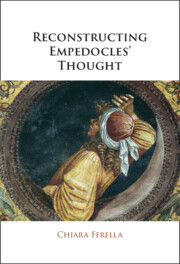Refine search
Actions for selected content:
2 results

Reconstructing Empedocles' Thought
-
- Published online:
- 01 February 2024
- Print publication:
- 08 February 2024
Chapter 6 - The Pythagorean way of life and Pythagorean ethics
-
-
- Book:
- A History of Pythagoreanism
- Published online:
- 05 May 2014
- Print publication:
- 24 April 2014, pp 131-148
-
- Chapter
- Export citation
